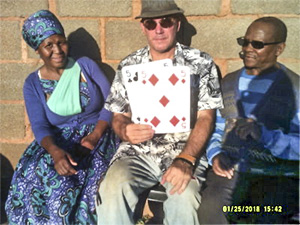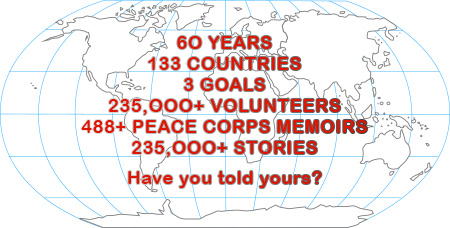In a post-pandemic world, the U.S. Peace Corps will be more important than ever (South Africa)
By Jeff Walsh (South Africa 2016–18)
“Education is the most powerful weapon you can use to change the world.”
Nelson Mandela
•
March 1st, 1961 marks the 60 year anniversary of the United States Peace Corps. Over two generations ago, U.S. President John F. Kennedy asked idealistic young Americans to “Ask not what your country can do for you but what you can do for your country.”
On that historic day in March, Kennedy signed Executive Order 10924, sending 750 volunteers on a historic journey to 13 countries. Ghana and the African Continent were the very first to receive U.S. volunteers. Northwestern has certainly done its part as one of the top volunteer-producing universities in the U.S.. Since the Peace Corps’ inception, Northwestern has sent nearly 1,000 volunteers to serve overseas in the Peace Corps.
 I was sworn into the Peace Corps with my cohort of 37 in Pretoria, the capital of South Africa, in 2016. During the ceremony, the U.S. Ambassador to South Africa referred to us as “grassroots ambassadors.” A pretty accurate description. Now all the grassroots ambassadors are gone. On March 15th, 2020 the Director of the Peace Corps Judy Olsen made the historic decision to recall all 7,000 volunteers in over 50 countries back to the United States due to the ever-increasing risks associated with COVID-19 and the worldwide pandemic. This was the first time in the storied 60 year history of the Peace Corps that there have been no volunteers in service. in the field. Let us wish for a safe and speedy return to the field for all Peace Corps volunteers. The Peace Corps needs the world and the world needs the Peace Corps. And in a post-pandemic world, the U.S. Peace Corps will be needed more than ever.
I was sworn into the Peace Corps with my cohort of 37 in Pretoria, the capital of South Africa, in 2016. During the ceremony, the U.S. Ambassador to South Africa referred to us as “grassroots ambassadors.” A pretty accurate description. Now all the grassroots ambassadors are gone. On March 15th, 2020 the Director of the Peace Corps Judy Olsen made the historic decision to recall all 7,000 volunteers in over 50 countries back to the United States due to the ever-increasing risks associated with COVID-19 and the worldwide pandemic. This was the first time in the storied 60 year history of the Peace Corps that there have been no volunteers in service. in the field. Let us wish for a safe and speedy return to the field for all Peace Corps volunteers. The Peace Corps needs the world and the world needs the Peace Corps. And in a post-pandemic world, the U.S. Peace Corps will be needed more than ever.
During the pause in service, many volunteers have continued volunteering in their local communities all over the U.S. Some volunteers are providing badly needed assistance to the frontline heroes in our hospital wards across the country today. With the blessing of Dr. Anthony Fauci and the National Institute of Health, the newly formed National Peace Corps Association Emergency Response Network began training Peace Corps volunteers as contact tracers last October. The newly trained contact tracers work with the Department of Health of Seattle and King County, Washington. Peace Corps Volunteers serve in the fields of education, agriculture, health, trade, technology, environmental protection, women’s economic empowerment, and community development. The Peace Corps may very well be the best value for the taxpayer dollars. Volunteers only get a small monthly stipend over a two year period for all the good they bring into the world. To put this in a proper perspective, just one Northrop B-2 Spirit Stealth Bomber costs 2.2 billion dollars for the military, while the whole annual budget of the entire Peace Corps is only 410 million dollars.
Early in 2017, during one of the many in-service Peace Corps conferences, I learned about the wonders of PEPFAR. PEPFAR or the U.S. President’s Plan for AIDS Relief, I was soon to find out, is an important Peace Corps initiative. At the conference, we heard from Dr. Neil Orr, co-author of Positive Health: Living Well with HIV. Dr. Orr is a research psychologist from South Africa and a public expert with a key focus on HIV and AIDs and sustainable development. Orr has been in the field of HIV and AIDS for over 20 years. His co-author David Patient had been living with HIV/ AIDS successfully for 33 years. The U.S. State Department website touts the success of PEPFAR — “20 million lives saved, preventing millions of HIV infections in over 50 countries and supports antiretroviral treatment for nearly 17.2 million people. PEPFAR has enabled 2.8 million babies to be born HIV-free to mothers living with HIV.”
Near my village of Maphoitsile, South Africa in the North West Province was a local radio station. I was lucky enough to be able to broadcast Public Service Announcements about HIV/AIDS prevention once a month with the approval of my Country Director. Initiatives like PEPFAR, Girls Leading Our World (GLOW), and former First Lady Michelle Obama’s “Let Girls Learn” are just a few of the initiatives sorely missed during the historic pause during the Pandemic.
Idealism, optimism, and the can-do spirit of the Peace Corps are needed now more than ever during these trying times. Anti-apartheid leader, freedom fighter, and President of the Republic of South Africa Nelson Mandela was right in saying that “a winner is a dreamer who never gives up.” Peace Corps volunteers thrive in less than ideal conditions. The old tried-and-true adverts from yesteryear still stand the test of time including “the toughest job you’ll ever love,”, “we want volunteers that see a glass of water as half-full,” and my personal favorite — “we need someone with a good back, strong stomach, a level head, and a big heart.”
A big heart might very well be the most important character trait of all for a Peace Corps volunteer. A big heart is at the heart of the Peace Corps oath, “I promise to serve alongside the people of (Country of Service). I promise to share my culture with an open heart and open mind. I promise to foster an understanding of the people of (Country of Service), with creativity, cultural sensitivity, and respect. I will face the challenges of service with patience, humility, and determination. I will embrace the mission of world peace and friendship for as long as I serve and beyond. In the proud tradition of Peace Corps’ legacy, and in the spirit of the Peace Corps family past, present, and future — I am a Peace Corps Volunteer.” The Peace Corps mission is as simple as it is profound — world peace and friendship. Volunteers will provide a sense of purpose and the sensitivity sorely needed in a post-pandemic world. Since 1961 nearly a quarter-million volunteers have answered President Kennedy’s clarion call.
“Happy birthday, Peace Corps!”
In the very near future, the Peace Corps will soon recommit to a global reentry plan with a renewed cross-cultural awareness, diversity, and inclusion for all.
•
Jeff Walsh (South Africa 2016–18) joined the Peace Corps in his 50s after having worked as a teacher, an Army medic, and an AmeriCorps volunteer. He was the first Peace Corps volunteer to be assigned to Maphoitsile, where he taught English and Lifeskills to primary school children. Twenty-three months into his service, volunteers in the region were evacuated due to safety concerns, and he completed his final months at the Peace Corps office in Pretoria. Jeff is currently a Masters of Sports Administration candidate in the School of Professional Studies, Northwester University.

Right on Jeff—President Biden has made a key point in his administration of signaling to the world that our country has returned to engaging as a partner with the rest of the world. Thousands of regular Americans, volunteering to engage in communities around the world is one of the most effective ways to carry out President Biden’s commitment. i say go for it!!!! Let’s go back to our countries and help every local medical clinic to handle this covid pandemic.Lets help every health clinic, hospital and school to connect to the worldwide web to access information, technical knowledge, international partners and exciting learning possibilities. Go for it Peace Corps—the job ahead remains a “Towering Task” , not just for Peace Corps but for every school, medical clinic, local hospital and small communities around the world.